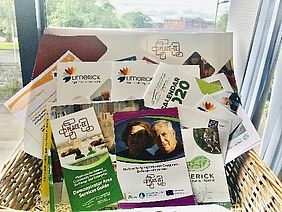This health crisis has a clear risk group: elderly people, who are amongst the most vulnerable to the COVID-19 infection, as well as to the consequences of living in isolation.
The NPA project PLACE-EE has been working since 2017 to reduce isolation of older people. One solution they found is to invite young students to teach elderly people how to access services and resources online. This worked extremely well, as you can also read in the Map of results in Northern Ireland, but the COVID-19 lockdown took the challenge to a higher degree. The partnership took matters in hand and responded with a range of new ideas, as is described in their latest newsletter - below you can read an extract.
A feel-good basket from Limerick Community Care Connect
The PLACE-EE team in Limerick has rolled out an initiative called Limerick Community Care Connect. The team have prepared over 1000 care packs which have been delivered through An Post, to cocooning older people, to assist them in focusing on positive things.
The packs contain information about the project including other items such as Library Service leaflets, Sports Partnership leaflets, Bird Watch Ireland factsheet, COVID literature, Flower Seeds, Song Lyrics, Poetry, Pollinator Ireland factsheets.
Una Breen an older person who received a pack stated, "Thank you so much for sending me the pack. It was like Christmas morning here, there were so many useful things and I didn't know what was going to come out of the pack next! ...I enjoyed learning about the PLACE-EE project and I will keep an eye on the archive".
A phone call with Mary, it takes this little to make a difference
The PLACE-EE team aided Mary Cronin, one of Limericks PLACE-EE participants to run, a peer to peer chat service called Reaching Out, Staying Connected. The service was launched on 20th April. To date there are 28 individuals, who receive a regular call from a cocooning older person, who will phone for a chat and to help pass the time.
This initiative was set up in response to requests from older people who indicated that they are not speaking to or hearing from anyone for days at a time and this service aims to alleviate this situation.
Eventually embracing technology
At a time when so many have lost family and friends to COVID-19, it can be hard to consider or voice positive outcomes of the pandemic. However in Fermanagh & Omagh, it was found that in terms of older people and digital technology there has been a massive step forward.
Older people who had previously skirted around the use of digital devices have now embraced the lifeline it presents to them. Those who had never considered the need for such technology have quickly learned the practical /essential benefits such applications can offer, including online banking, shopping and the video call components of apps like Facebook and WhatsApp enabling them to keep in touch and connected to family and friends.
“Digital technology has enabled me to stay in touch with loved ones, so although I was isolated, I was never alone. My grandson was born seven weeks ago, during lockdown, and only for the likes of WhatsApp and Facebook I wouldn’t have seen him or shared in this special family moment” says Desmond, from Dromore.
"I’m an avid reader, so when lockdown happened, and I only had six books in the house, I decided, if I was going to get through this lockdown in one piece, I had to learn how to access books digitally. I had previously downloaded an app called ‘Overdrive’ onto my phone, ‘Overdrive’ is the NI Libraries online collect, but I had never used it and it took the lockdown for me to finally access it, now I couldn’t be without it" says Ellen, from Gortin.
The meteoric rise of video conferencing may well have changed people’s working lives forever, but it has also presented us with a new tool in combating the social isolation of our older people, especially those living in the most rural parts of our community.
Fermanagh & Omagh District Council through the PLACE-EE Project is currently undertaking consultations via video conferencing with older people from across the district, and delivering where needed, one to one tuition on using video conferencing programmes. This ensures that many of our older people have the skills, and more importantly, the confidence to fully embrace this opportunity to continue to participate and interact with their peers.
Once the consultation is complete, Fermanagh & Omagh District Council PLACE-EE will then roll out a suite of online activities: social, recreational, educational and advice based that will continue to support, encourage and promote social interactions for our older people.
Pop-up events to keep the Icelandic seniors active
Drawing from what was learned in PLACE-EE, Fjardabyggd successfully applied for special funding from the Icelandic government, through the Ministry of Health, for supplementary projects in adult social work during Summer 2020. The additional resources will be used to increase activity, organise pop-up events, and keep the senior society active throughout the summer.
COVID-19 means it is very important to re-start the social work of senior citizens, as most elderly have been in self-contained isolation. Fjardabyggd hopes that PLACE-EE and the additional projects will help reduce social isolation of senior citizens and increase their well-being.
Artificial Intelligence in care homes in Skellefteå
The world-wide COVID-19 pandemic has had an obvious impact on the work of PLACE-EE in Skellefteå. In Sweden there has been fewer restrictions on mobility than other countries, however the care homes and older people in general have been isolated to avoid the risk of contagion. This means that those issues targeted by the project, such as isolation and loneliness, will likely have a stronger impact as the project has not been able to continue the intergenerational work.
In response to this challenge, alternative paths have been explored that can realistically continue to address loneliness and isolation of older people during this unprecedented time. Taking a cue from a recent pilot in Stockholm, Skellefteå is going to explore using devices with voice technology AI in care homes. The idea being that talking to artificial intelligence is probably better than having no interaction at all.
The intergenerational aspect will be kept alive by recruiting young job-seekers and their role will be to provide remote set-up and technology support. The initial trial will start after the summer.


